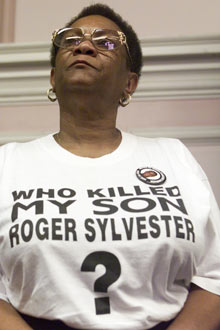http://gu.com/p/33xk2/tw via @guardian
The deaths pile up each year, and it has been a shocking 42 years since any officers have been found guilty
 Sheila Sylvester, whose son Roger dhttp://gu.com/p/33xk2/tw via @guardianied in custody. Photograph: Graham Turner for the Guardian
Sheila Sylvester, whose son Roger dhttp://gu.com/p/33xk2/tw via @guardianied in custody. Photograph: Graham Turner for the Guardian This Saturday will see family, friends and many others marching against deaths in police custody in an annual event that is now entering its 13th year. The list of those who've died has grown ever longer, as does the gap between now and the last time a police officer was prosecuted for the death of somebody in custody – that record stretches back a shocking 42 years to 1969, when the two officers who were implicated in the death of David Oluywale, the first black man to die in police custody in the UK, were found guilty of assault and sentenced to a pitiful few months in prison.
Since this isolated case, there have been more than 1,000 more deaths in custody, and not one successful prosecution of a single police officer, despite a verdict of unlawful killing in several instances – a verdict handed down only after years, or even decades, of work, campaigning and painstaking legal challenges by the families of those killed (these struggles are well documented in Ken Fero's documentary Injustice). The past few months have seen a couple of high-profile deaths – Smiley Culture and Mark Duggan – as well as the increased use of Tasers. Three people (Dale Burns, Jacob Michael and Philip Hulmes) died after being shot with Tasers in an eight-day period in August this year. Tasers were also used more recently during the violent eviction of Dale Farm, directly contrary to police guidelines that state they should not be used in public order situations.
A report on deaths in custody put out by the IPCC, widely criticised for its lack of independence from the force, nevertheless revealed: "There was a breach of police procedure in 27% of cases and … people from black and minority ethnic backgrounds were more likely to be restrained whilst in police custody than whites." Despite the Metropolitan police being declared "institutionally racist" in 1999's Macpherson report, this doesn't appear to have stopped them from being actually racist in any respect.
Many people don't experience police brutality, of course, and it is all too easy to imagine that a death in custody must have had some mitigating circumstance, especially when the media is often complicit in putting out stories that work to damn the victim – so we heard that Mark Duggan was a "gangster", that he "shot first", just as Jean Charles de Menezes was wearing a "bulky jacket" and "jumped over the barriers"; none of these things are true but, when released in the first few hours of a story, they can significantly alter the perception of the victim, even if this misinformation is later corrected.
The procession on Saturday has huge significance for the families of, among many others, Roger Sylvester, Leon Patterson, Rocky Bennett, Alton Manning, Christopher Alder, Brian Douglas, Joy Gardner, Aseta Simms, Ricky Bishop, Paul Jemmott, Harry Stanley, Glenn Howard, Mikey Powell, Jason McPherson and Sean Rigg, but it also has significance for everyone concerned about the lack of police accountability and their growing use of force against the population. The United Friends and Family Campaign – which has organised Saturday's march – calls, among other things, for the investigation of deaths in police custody by a body that is "genuinely independent of the police", for automatic prosecution of officers following verdicts of unlawful killing and for CCTV to be placed in the back of all police vans – Lord knows, we have it everywhere else.
Samantha and Marcia, sisters of Sean Rigg, who died in Brixton police station, said: "It is now over three years since Sean died and still we are fighting to get crucial evidence from the IPCC. Why? This is our fourth attendance on the UFFC march and it beggars belief the number of deaths that have occurred since Sean died … We as families do not have justice; we just have us. It is therefore evident that families must unite to remember their loved ones and continue their quest for justice and change in the British judicial system. No justice. No peace."
Lack of police accountability and police violence during arrests, in police cars, in police custody and in prison cells, as well as at protests and occupations, is something that concerns us all. Let there be justice for those who have died in custody, and let no one else suffer the same fate: join the march on Saturday and let the families and friends of those who are suffering know that they are not alone.

No comments:
Post a Comment